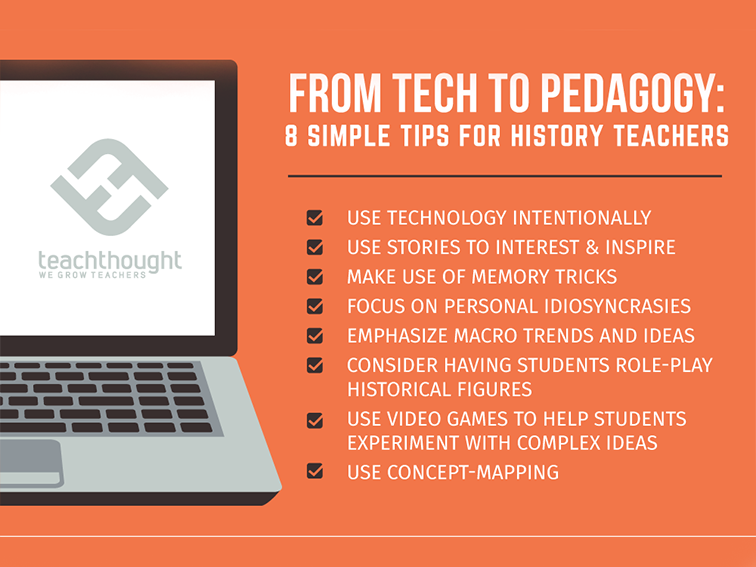From Tech To Pedagogy: 8 Simple Tips For History Teachers

contributed by Manuel Muroni
As a teacher, one of the most difficult subjects to teach can be history. With only a few exceptions, the young, active minds of students tend to shy away from textbook recitation and dusty lists of boring dates.
Standard procedure is to memorize the corresponding names and dates and battles long enough to pass the next text, after which that knowledge is categorized and more or less lost. History, however, is a fresh and exciting subject that should inspire and delight.
As you prepare your next history curriculum, here are some important points to keep in mind–and above all, keep on learning yourself. Being fascinated with your subject material is the best way to ensure that your students will remember it after the tests are done.
From Tech To Pedagogy: 8 Simple Tips For History Teachers
1. Use Technology Intentionally
Young people today spend a lot of time on electronic devices. Especially if you are teaching older students, you will probably find that most will want to take notes on a laptop or even a cellphone.
If your goal is long-term retention, one approach is to not allow this. Scientific studies show that taking notes by hand helps a human mind memorize data far more effectively than typing. (Though you can take digital notes with technology if that’s your preference.)
2. Use Stories To Interest & Inspire
Don’t make dates your central teaching platform. Instead, focus on the stories of the very real men and women who made history.
A great teaching aid is a living history book, also known as historical fiction. These books are written about real periods in history, and often feature real characters. The main character is usually fictionalized, a character that easily could have lived during that time.
Historical fiction novels are available for every grade level and content area. Try choosing a novel based in a central part of your field of study and read it aloud to your class for a certain amount of time every day. Many students will appreciate this form of teaching, as it likely a change of pace from your normal approach.
For an older or more advanced class, you might consider using G.A. Henty novels. While sometimes heavy going, these novels are rich in fact and detail. Movies like Braveheart, Ben-Hur, and Gladiator can also be an aid for a high school class, as they provide tangible details and gritty reality.
3. Make Use Of Memory Tricks
Mnemonic tricks, like rhyming stanzas, are used because they work. Everyone knows when ‘Columbus sailed the ocean blue.’ Associating different events that happened across the world during the same year is another great way to boost date memory.
4. Focus On Personal Idiosyncrasies
If you want your students to retain knowledge about the key players in history beyond their next test, you must incorporate more interesting facts than names, dates, and major life events. Trivia is a great attention grabber, and students especially love hearing about adults’ less well-known habits or feats tendencies.
For example, Winston Churchill’s mother was an American. He almost failed to make it into military school and was extremely accident prone. He also loved playing poker, especially with his friend US President Harry Truman who allegedly threw a poker game during one of Churchill’s visits to America.
To reinforce the impression that history is not two-dimensional, have your students do hands-on activities that supplement the textbook material.
Creating genealogical charts of complicated royal bloodlines, or crafting paper models of famous architecture, i.e. the Great Wall of China, will help to correlate names, dates, ideas, and realities, all hopefully resulting in more engaged minds and long-term retention of content.
5. Emphasize macro trends and ideas (cause/effect, change over time, bias and perspective, credibility and citations, etc.)
6. Consider having students role-play historical figures for immersion. Ask students to host a fictional debate between Winston Churchill and Franklin Delano Roosevelt about the timing of American support during WII, for example.
7. Use video games to help students experiment with complex ideas (like culture in Civilization VI or the importance of environmental resources and location in Age of Empires, etc.)
8. Use concept-mapping to demonstrate complex ideas and their patterns and relationships.
From Tech To Pedagogy: 8 Tips For History Teachers; image attribution wikimediacommons
